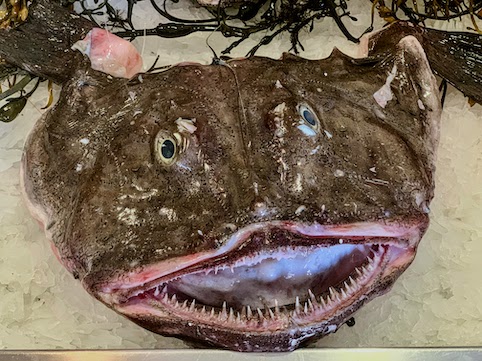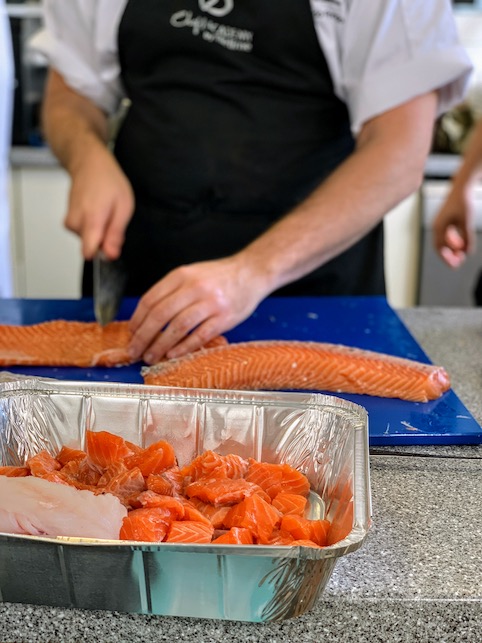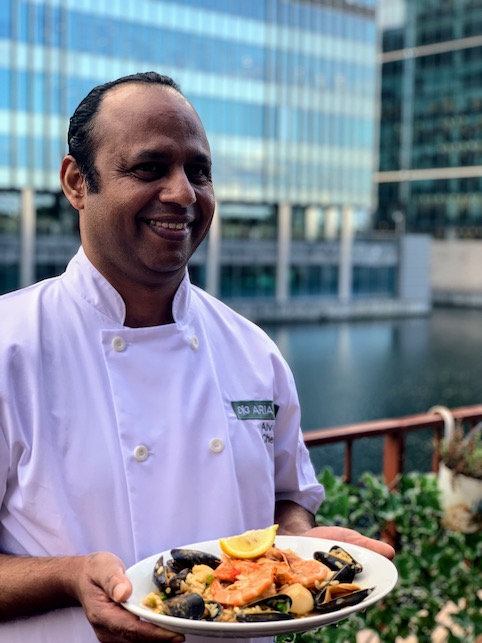‘They come in this high,’ says Joe Hurd, the Chef Ambassador for Chef Academy, indicating a spot somewhere around his knees, ‘and leave this high’, indicating a spot way over his head.
He’s talking about the chef apprentices he and his colleagues train through Lifetime Training. Many of the people that come through the doors can be pretty much rank beginners in the kitchen. Some are also challenged by mental health issues and low self-esteem. All are welcome.

Lifetime is a national training provider that delivers apprenticeship training solutions to businesses.Their Chef Academy is a unique, government recognised model for enhancing traditional chef apprenticeships.
Joe Hurd believes that this new style of apprenticeship holds the key for the future of the industry. Employers can send trainees to learn and the courses are funded by the employers’ contributions to the government apprentice levy.
Today we’re at Billingsgate Fish Cookery School where about twelve apprentices have come from the kitchens of Aria care homes. The CEO of Aria, Caroline Roberts, is also here, keen to lend not just official support to the initiative but also her personal enthusiasm.
She tells me she wants the residents to get good food at a good price, while at the same time having kitchens where happy and diverse teams can work with minimum waste. She is also looking forward to lunch, and so am I.
Knowing your stuff means knowing your fish and knowing how to break it down. The apprentices, who have mostly never prepped a fresh fish before, stand expectant in front of a table groaning with fresh fish and shellfish from the market downstairs.
The trainers explain some basics, namely how to spot less than fresh fish – sunken eyes, saggy flesh and bad smell of course. Plus ‘no head’. “If it’s got no head, then they’re hiding something!”

This last rule does not apply to Monkfish, whose Dr Who monster head would put anyone off buying this delicious fish. A sample head balefully stares up at us from the table to make the point.
The trainers demonstrate filleting a whole fish, from a large salmon to a small whiting. They show how a flexible sharp knife is vastly superior to a rigid one as it will ‘feel’ its own way around the bone, while staying very close to it and so less waste. Tweezers are employed to remove pin bones, important when fish is to be served to the elderly. Remember the trouble the Queen Mum used to get into with fish?
A volunteer is called for and a shy young lad sheepishly volunteers to tackle a whiting. Guided by a trainer, he does a really rather good job of it, the applause he gets from his team brings a big smile to his face. You can see him ‘growing’.
White fish, salmon and prawns are all made ready for a classic fish pie. Food in a care home does not have to be Michelin star, just wholesome and tasty and everyone loves a fish pie.

The apprentices make their white sauces and pipe on the mash, with varying degrees of success at first, it’s another skill that will come with practice. ‘It doesn’t have to be piped on of course,’ says Joe, ‘but it looks so much nicer on the plate and that’s important too for the residents, that something looks like it’s been made with care.’
Moving on the apprentices each try their hand at seafood risotto. There is a fully equipped workstation for each trainee and I join one to have a go. We check and prep mussels, ‘if they don’t close when tapped, then don’t use them’ and devein prawns ‘not a nice taste, or texture and potentially a risk of food poisoning’. It also makes them present nicer on the plate.
The induction hobs take some getting used to after gas, but these are more and more present in professional kitchens being very easy to clean, as well as energy efficient.
A risotto is simple in theory, not so easy in practice, cooking rice just right requires a feel that only comes with practice, even though the instructors are offering advice all the time. I burn my onions ( I blame the induction hob), and my rice is a bit too al dente, as it is not properly cooked.

It looks good though, so I add it to the table of risottos for judging. I do not win, or even come close. I go off to one side and eat my crunchy failure, although it still tastes pretty good to me. No one is unhappy and we all cheer the winner with genuine enthusiasm, everyone knows that they’ve learned something and that’s what matters
It’s good to see new cooks from all kinds of backgrounds, one middle-aged lady tells me she wanted to move from housekeeping at the care home into the kitchen and was encouraged all the way. She loves her new job and all the new things she’s learning as well as the team spirit.
We often think chefs only exist in restaurants, but of course institutions from schools to prisons also need great cooks and Lifetime Training is making sure they will get them.
